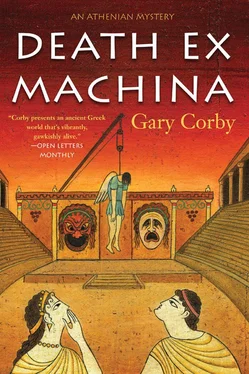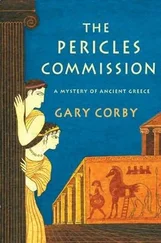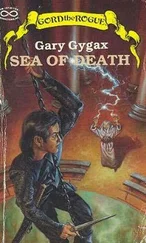Gary Corby - Death Ex Machina
Здесь есть возможность читать онлайн «Gary Corby - Death Ex Machina» весь текст электронной книги совершенно бесплатно (целиком полную версию без сокращений). В некоторых случаях можно слушать аудио, скачать через торрент в формате fb2 и присутствует краткое содержание. Год выпуска: 2015, ISBN: 2015, Издательство: Soho Press, Жанр: Исторический детектив, на английском языке. Описание произведения, (предисловие) а так же отзывы посетителей доступны на портале библиотеки ЛибКат.
- Название:Death Ex Machina
- Автор:
- Издательство:Soho Press
- Жанр:
- Год:2015
- ISBN:978-1-61695-520-5
- Рейтинг книги:3 / 5. Голосов: 1
-
Избранное:Добавить в избранное
- Отзывы:
-
Ваша оценка:
- 60
- 1
- 2
- 3
- 4
- 5
Death Ex Machina: краткое содержание, описание и аннотация
Предлагаем к чтению аннотацию, описание, краткое содержание или предисловие (зависит от того, что написал сам автор книги «Death Ex Machina»). Если вы не нашли необходимую информацию о книге — напишите в комментариях, мы постараемся отыскать её.
Death Ex Machina — читать онлайн бесплатно полную книгу (весь текст) целиком
Ниже представлен текст книги, разбитый по страницам. Система сохранения места последней прочитанной страницы, позволяет с удобством читать онлайн бесплатно книгу «Death Ex Machina», без необходимости каждый раз заново искать на чём Вы остановились. Поставьте закладку, и сможете в любой момент перейти на страницу, на которой закончили чтение.
Интервал:
Закладка:
They looked at each other. Already I could see the lies forming.
I said to them, “If you lie to me and I find out you lied, Pythax will be the least of your problems.”
“We were drinking, master,” Euboulides said at once.
I’d already guessed that.
“How?” I demanded. “Do you mean to tell me you left your post to get a drink?”
“No sir,” said Pheidestratos. “We never left the theater. Honest. There was a woman with us.”
I groaned. “This is getting worse.”
“No sir, he means the woman came to us,” Euboulides corrected. “She wanted to sell us a drink-”
“But we didn’t have no money,” Pheidestratos broke in. “On account of us being slaves. So she said, seeing as how we were only slaves, that she’d give us a cup for free.”
“A strange woman offers you a drink, and you just take it, no questions asked?”
“Yes sir!” They said in unison.
“We’re slaves, sir,” Euboulides added helpfully.
If I’d been them, I would have drunk alcohol at someone else’s expense too.
“It was cold in the middle of the night, master,” Pheidestratos said. “We didn’t think it would do any harm. One little drink to keep us warm.”
Pheidestratos was begging for forgiveness. I could ignore that, but not the information that came with it.
“ One drink?” I repeated.
“Yes, master.”
“She didn’t leave an amphora or a wineskin?”
“No, master.”
“Do you both swear by Zeus and Athena that you each drank one normal cup?”
They both swore.
“Then we got tired, master.”
“After just one cup?” I repeated.
“Yes, master.” Euboulides frowned. He was the smart one. “It don’t normally take only a cup to knock me down, master. Normally it’s more like … uh … ten.”
There was no way that a normal healthy man could be felled by one cup. Nor were these ordinary men. They were the Scythian Guard of Athens, under the care of Pythax, whose idea of light exercise was an all-day march in full armor. It was impossible that these men could have been knocked out by a single drink.
Diotima looked at me and I looked at her.
“A pharmacis ,” she said. “A witch woman.”
I nodded. A pharmacis was a woman expert in herbs and medicines … and in poisons. How many pharmacai were there in Athens? A hundred? My mother would know. Pregnant women were among the biggest buyers of pharmacis medicines. There must be a pharmacis in every deme, two in the poorer demes where people couldn’t afford a doctor, and would turn to their local pharmacis for help.
But why would a witch woman want to kill an actor?
“What did this woman look like?”
“Don’t know, sir!”
“Why not?”
“She wore a cape, sir. One of the ones with a hood.”
“Was she tall or short?”
“Kind of stooped, sir,” Euboulides said.
There wasn’t the slightest chance of identifying her, whoever she was.
“Come with me.”
I returned to Sophocles and Aeschylus, and told them what we knew. Sophocles looked disgusted.
I grabbed an ostrakon -a broken shard of pottery-that lay on the ground amongst the seats of the theater. I scratched a message into it, then handed the ostrakon to Euboulides. I said, “Take this to Pericles.”
Euboulides nodded. “Yes, sir.” He left at a trot.
“What was the message?” Sophocles said.
“That we have a problem,” I said. “My commission is with Pericles. He needs to know.” I winced.
“You’re worried?” Aeschylus asked.
“Sympathy for failure is not one of Pericles’s strong points.”
“It’s not your fault,” Aeschylus consoled me. “I’m sure Pericles will understand.”
I wished I had his confidence.
A reply came back sooner than I expected, carried by a slave runner. He handed it to me.
PERICLES SAYS THIS TO NICOLAOS. I HAVE CALLED AN EMERGENCY COUNCIL TO DISCUSS THE CRISIS. WE MEET AT NOON AT MY HOUSE. THAT WILL GIVE MEN OUTSIDE THE CITY TIME TO ARRIVE. IT WILL ALSO GIVE ME TIME TO THINK WHAT WE ARE GOING TO SAY TO ALL THE DISTINGUISHED GUESTS FROM OTHER CITIES WHEN THEY LEARN OF THIS DEBACLE. SAME SUMMONS TO MEET IS GOING TO THE ARCHONS, TO THE CHOREGI, TO THE WRITERS, AND ALL OTHER SENIOR MEN OF THE DIONYSIA. INFORM EVERYONE AT THE THEATER WHO FITS THAT DESCRIPTION. PERICLES.
I silently handed the ostrakon to Aeschylus, who read it with raised eyebrows. He handed it to Sophocles, who handed it to Lakon, who handed it to Kiron. The ostrakon made its way around the producers, writers, and actors of every comedy and every tragedy.
“Thank you,” I said to the messenger slave. “Tell Pericles we’ll be there.”
“Sir, I also have a message for you,” said the slave.
“For me?” I said. “What does Pericles say?”
“My master Pericles says you are to arrive early, if you can manage to do that simple thing without tripping over your own feet, you incompetent moron.”
The slave grinned as he said it.
I had little doubt that the slave had passed on the message exactly as Pericles had spoken it, but I was equally sure it was the slave’s own special touch to repeat it in front of all these leading citizens.
Aeschylus broke the embarrassed silence. He squinted up at the sun. He said, “Noon. That gives us plenty of time before the meeting.”
“I’ll need it,” I said.
“Oh?”
“I have to inform a family that they’re bereaved. Where did Romanos live?” I asked, then added, “Does he have family here?”
“Not as far as I know,” Kiron said. He turned to Sophocles, who shrugged.
“I hired him because he’s a good actor, not because he’s a friend,” the playwright said. “I have no idea about his family.” Sophocles turned to the man beside him. “Do you know, Lakon?”
“I’ll need to think about that,” Lakon said. He immediately struck a thoughtful pose, hands behind his back, chin sunk to his chest. After a few moments he said, “Yes, I do believe the poor fellow lived in Melite.”
Melite was a deme to the west of Athens but within the city walls. It was a place of narrow lanes and crowded tenements. Finding the victim’s home amongst them would be a nightmare.
I said, “I don’t suppose you know where in Melite he lived?”
“I’m afraid you’ll have to ask around. I said I knew the man, not that I socialized with him.”
“You mentioned that before,” Diotima said. “Was there some bad blood between you?”
Lakon turned to her. “Not at all, dear lady, but being a woman, you wouldn’t understand.”
I quickly stepped between Lakon and Diotima, in case Diotima decided to punch out our lead actor. I’d seen her hit before in anger and we needed Lakon to remain conscious. But Diotima showed creditable restraint.
“Why don’t you try anyway,” Diotima said, through gritted teeth. “Despite my obvious limitations.”
“I am a citizen actor,” Lakon said. “I do not act for money. That would be demeaning.”
“What about Romanos?”
“He acted for money.”
SCENE 14
It was essential we find the family of Romanos, if he had one, and if not, his home, so that we could search it. Someone, somewhere, had a reason to want Romanos dead. Someone, or some evidence, was going to have to tell us why.
Lakon had told us that Romanos lived in Melite, a deme directly west of the theater. I refused to have Socrates with us when we delivered bad news. He was the least tactful person I knew. I sent him home. As we walked away in the opposite direction, Diotima said, “If Lakon turns out to be the killer, I will personally offer my thanks to the Gods with a fine sacrifice.” She was still angry about his attitude. In her sandals, Diotima kicked a loose stone on the path in anger. The stone went flying, and she spent the rest of the trip cursing her sore toe.
Читать дальшеИнтервал:
Закладка:
Похожие книги на «Death Ex Machina»
Представляем Вашему вниманию похожие книги на «Death Ex Machina» списком для выбора. Мы отобрали схожую по названию и смыслу литературу в надежде предоставить читателям больше вариантов отыскать новые, интересные, ещё непрочитанные произведения.
Обсуждение, отзывы о книге «Death Ex Machina» и просто собственные мнения читателей. Оставьте ваши комментарии, напишите, что Вы думаете о произведении, его смысле или главных героях. Укажите что конкретно понравилось, а что нет, и почему Вы так считаете.












